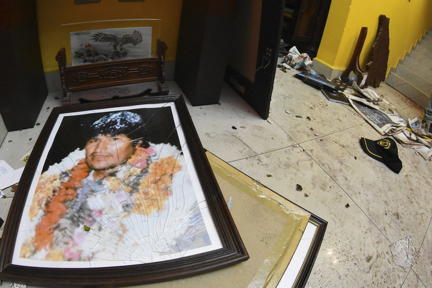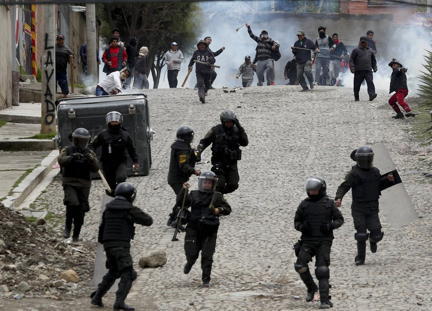
(above) A broken portrait of former Bolivia’s President Evo Morales is on the floor of his private home in Cochabamba, Bolivia, after hooded opponents broke into the residence on Sunday, Nov. 10, 2019. (AP Photo)
Bolivia in Power Void as Morales, Would-Be Successors Resign
November 11, 2019 - Original article: www.Latino Rebels.com
By PAOLA FLORES and CARLOS VALDEZ, Associated Press
LA PAZ, Bolivia (AP) — Bolivia entered a sudden era of political uncertainty on Monday as President Evo Morales, pushed by the military and weeks of massive protests, resigned after nearly 14 years in power and seemingly every person constitutionally in line for the job quit as well.
Crowds of jubilant foes of the socialist leader celebrated in the streets with honking horns and fireworks after Morales’s announcement Sunday, treating as a triumph of democracy the ouster of a man who pushed aside presidential term limits and claimed victory in a widely questioned October election.
“We are celebrating that Bolivia is free,” said one demonstrator near the presidential palace.
But others —including Morales himself— saw it as a return to the bleak era of coups d’etat overseen by Latin American militaries that long dominated the region. Morales stepped aside only after the military chief, Gen. Williams Kaliman, called for him to quit to allow the restoration of peace and stability.
Morales earlier in the day had already accepted calls for a new election by an Organization of American States team that found a “heap of observed irregularities” in the Oct. 20 election whose official result showed Morales getting just enough votes to avoid a runoff against a united opposition.
It wasn’t immediately clear who would succeed Morales, or how his successor would be chosen.
His vice president also resigned as did the Senate president, who was next in line. The only other official listed by the constitution as a successor, the head of the lower house, already had resigned.

(below) Opponents of Bolivia’s President Evo Morales celebrate after he announced his resignation, in La Paz, Bolivia, Sunday, Nov. 10, 2019. (AP Photo/Juan Karita)
There were no immediate signs that the military itself was maneuvering for power, but “I think we have to keep a close eye on what the military does over the next few hours,” said Jennifer Cyr, associate professor of political science and Latin American studies at the University of Arizona. “Are they overstepping their role?”
She said “the power vacuum opens up space for the military to potentially step in.”
Morales was the first member of Bolivia’s indigenous population to become president and he brought unusual stability and economic progress, helping cut poverty and inequality in the impoverished nation, and he remains deeply popular among many Bolivians. Backers of the president have clashed with opposition demonstrators in disturbances that have followed the October vote.
After nightfall, there were reports of tensions in La Paz and the neighboring city of El Alto, with reports of looting and burning of public property and some houses.
The leadership crisis had escalated in the hours leading up Morales’ resignation. Two government ministers in charge of mines and hydrocarbons, the Chamber of Deputies president and three other pro-government legislators announced their resignations. Some said opposition supporters had threatened their families.
In addition, the head of Bolivia’s Supreme Electoral Tribunal, María Eugenia Choque, stepped down after the release of the OAS findings. The attorney general’s office said it would investigate the tribunal’s judges for possible fraud, and police later said Choque had been detained along with 37 other officials on suspicion of electoral crimes.
Morales, whose whereabouts were unknown, went on Twitter late Sunday to claim authorities were seeking to arrest him, but police Gen. Yuri Calderon denied any apprehension order had been issued for him.
In his tweet, Morales said: “I report to the world and Bolivian people that a police officer publicly announced that he has instructions to execute an unlawful apprehension order against me; in addition, violent groups also stormed my home.”